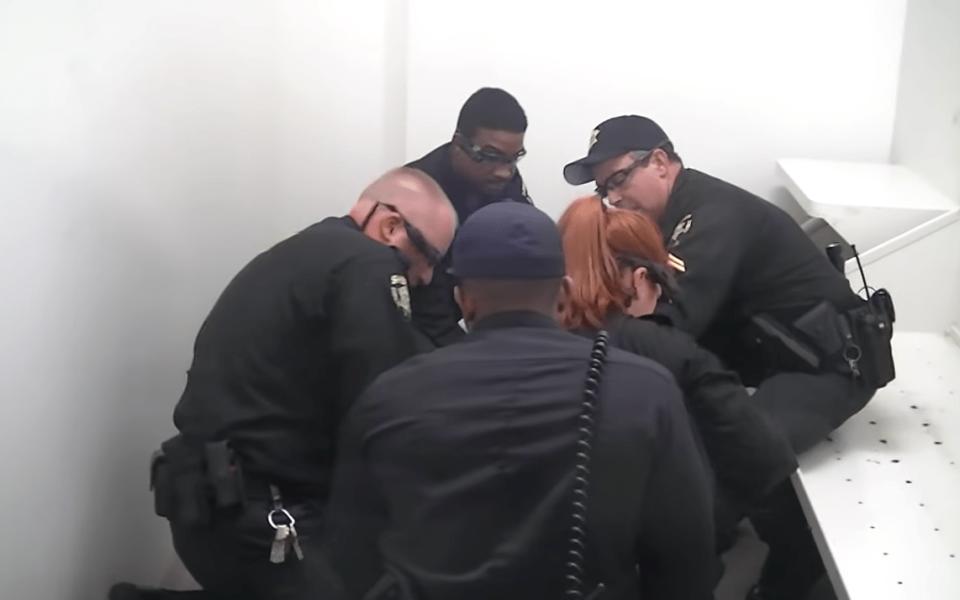Video shows detention officers at the Forsyth County jail piling on top of John Neville.
The Forsyth County Sheriff’s Office has added new guidelines to its policies regulating how detention officers restrain people in the jail who are being held face down, a position known as prone restraint. The update is part of an ongoing series of policy changes at the agency in response to protests against the death of John Neville in the Forsyth County jail and that of George Floyd in Minneapolis.
The policy change, which was added yesterday, prohibits staff in the detention center from “utilizing the bent leg technique” in situations “when individuals are restrained in the prone position,” and instructs staff to “avoid physical holds that put pressure on an individual’s back, neck, chest or abdomen except as a temporary measure to gain the individual’s compliance for the safety of themselves and others.”
The medical examiner who completed Neville’s autopsy said that when detention officers placed him face-down on a mattress in a cell, his legs were “flexed into a trifold position with his heels near his buttocks.” Neville repeatedly said, “I can’t breathe,” and, “Help me,” as detention officers held him face-down and tried unsuccessfully to remove his handcuffs, first with keys, and then with bolt-cutters, and then he stopped breathing. He died two days later at Baptist Hospital. His autopsy listed the cause of his death as “complications of positional and compressional asphyxia during prone restraint.”
Previously, following the announcement that five detention officers and a nurse were charged with involuntary manslaughter, the use-of-force policy was revised to state that “resisting individuals, who must be placed into a prone (face down) position to be subdued, should be positioned to a sitting position or placed on their side as soon as restraining devices are applied.”
Notably, Neville was already restrained in a chair and was being compliant, according to both the autopsy and video of the incident, when detention officers made him lie face-down on the mattress.
Neville is at least the second person to die after being placed in the prone restraint at the Forsyth County jail. The News & Observer reported that Sheila McKellar died after being bound, gagged and placed faced down in a holding cell at the jail in 1992.
The use of the prone restraint, also known as hogtying, has been controversial for some time. Marcus Deon Smith died after being placed in a prone restraint by Greensboro police officers in September 2018, in what the medical examiner ruled a homicide by positional asphyxiation. In the December 2019 issued of Policing magazine, Dr. Lawrence Heiskell, an emergency physical and veteran reserve officer with the Palm Springs, (Calif.) Police Department, wrote: “To reduce the risk of positional asphyxia, the use of the maximal face-down restraint technique should be avoided. If it is necessary to position a person face-down under restraint, then the subject must be closely and continuously monitored.”
Following the revelations about Neville’s death in the Forsyth County jail, calls for the Forsyth County Sheriff’s Office to ban hogtying, or prone restraint, have come from a range of stakeholders, including Triad Abolition Project, the Winston-Salem Urban League and Kathy Manning, the Democratic nominee in the 6th Congressional District.
Responding to the policy revisions on Friday, Bailey Pittenger, a co-organizer of Triad Abolition Project, said the changes don’t go far enough.
“This still isn’t a ban on the prone restraint, which is what we’re requesting,” she said. She also said it’s disappointing that the restrictions only apply to the detention center and don’t include deputies in the patrol division.
Black Lives Matter Winston-Salem, another group that has been active in calling attention to Neville’s death and more generally the treatment of people incarcerated, issued a statement hailing the policy changes “as a victory that was won by our collective movements” and public pressure to release video and documents.
In a follow-up email, the group said it “acknowledges the recent change in the Forsyth County Sheriff and law enforcement hold policy as a woefully inadequate reform. However, we do not see the chance in the use-of-force policy as something that will alter the overall behavior of our law enforcement and incarceration personnel.”
Join the First Amendment Society, a membership that goes directly to funding TCB‘s newsroom.
We believe that reporting can save the world.
The TCB First Amendment Society recognizes the vital role of a free, unfettered press with a bundling of local experiences designed to build community, and unique engagements with our newsroom that will help you understand, and shape, local journalism’s critical role in uplifting the people in our cities.
All revenue goes directly into the newsroom as reporters’ salaries and freelance commissions.


Leave a Reply